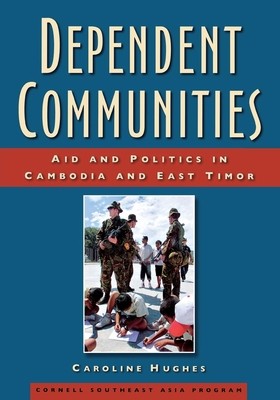
- We will send in 10–14 business days.
- Author: Caroline Hughes
- Publisher: Southeast Asia Program Publications
- ISBN-10: 0877277788
- ISBN-13: 9780877277781
- Format: 18 x 26.2 x 2.3 cm, kieti viršeliai
- Language: English
- SAVE -10% with code: EXTRA
Reviews
Description
Dependent Communities investigates the political situations in contemporary Cambodia and East Timor, where powerful international donors intervened following deadly civil conflicts. This comparative analysis critiques international policies that focus on rebuilding state institutions to accommodate the global market. In addition, it explores the dilemmas of politicians in Cambodia and East Timor who struggle to satisfy both wealthy foreign benefactors and constituents at home-groups whose interests frequently conflict. Hughes argues that the policies of Western aid organizations tend to stifle active political engagement by the citizens of countries that have been torn apart by war. The neoliberal ideology promulgated by United Nations administrations and other international NGOs advocates state sovereignty, but in fact "sovereignty" is too flimsy a foundation for effective modern democratic politics. The result is an oppressive peace that tends to rob survivors and former resistance fighters of their agency and aspirations for genuine postwar independence. In her study of these two cases, Hughes demonstrates that the clientelist strategies of Hun Sen, Cambodia's postwar leader, have created a shadow network of elites and their followers that has been comparatively effective in serving the country's villages, even though so often coercive and corrupt. East Timor's postwar leaders, on the other hand, have alienated voters by attempting to follow the guidelines of the donors closely and ignoring the immediate needs and voices of the people. Dependent Communities offers a searing analysis of contemporary international aid strategies based on the author's years of fieldwork in Cambodia and East Timor.
EXTRA 10 % discount with code: EXTRA
The promotion ends in 23d.09:01:22
The discount code is valid when purchasing from 10 €. Discounts do not stack.
- Author: Caroline Hughes
- Publisher: Southeast Asia Program Publications
- ISBN-10: 0877277788
- ISBN-13: 9780877277781
- Format: 18 x 26.2 x 2.3 cm, kieti viršeliai
- Language: English English
Dependent Communities investigates the political situations in contemporary Cambodia and East Timor, where powerful international donors intervened following deadly civil conflicts. This comparative analysis critiques international policies that focus on rebuilding state institutions to accommodate the global market. In addition, it explores the dilemmas of politicians in Cambodia and East Timor who struggle to satisfy both wealthy foreign benefactors and constituents at home-groups whose interests frequently conflict. Hughes argues that the policies of Western aid organizations tend to stifle active political engagement by the citizens of countries that have been torn apart by war. The neoliberal ideology promulgated by United Nations administrations and other international NGOs advocates state sovereignty, but in fact "sovereignty" is too flimsy a foundation for effective modern democratic politics. The result is an oppressive peace that tends to rob survivors and former resistance fighters of their agency and aspirations for genuine postwar independence. In her study of these two cases, Hughes demonstrates that the clientelist strategies of Hun Sen, Cambodia's postwar leader, have created a shadow network of elites and their followers that has been comparatively effective in serving the country's villages, even though so often coercive and corrupt. East Timor's postwar leaders, on the other hand, have alienated voters by attempting to follow the guidelines of the donors closely and ignoring the immediate needs and voices of the people. Dependent Communities offers a searing analysis of contemporary international aid strategies based on the author's years of fieldwork in Cambodia and East Timor.


Reviews